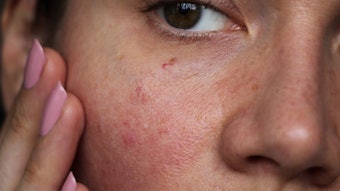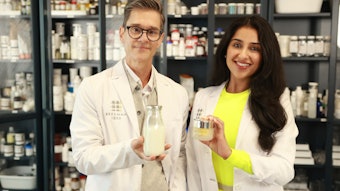
For years, recombinant proteins for beauty have emerged at tradeshows and conferences across the globe, including the December 2023 SCC Annual Meeting, the 2024 PCHi tradeshow in China and in-cosmetics Global. Dai, et al., reported in the April 2023 C&T that such innovations have been in the works for decades, and thanks to advances in genetic and cellular engineering, more effort has been put into recombinant collagen production. Considering the momentum they're gaining, here C&T explored recombinant proteins in beauty, including what they are, how they're used, market demand, future directions and their production with industry experts Mindy Goldstein, Ph.D., and Johnny Cordiner, CEO of the biotech firm Phenotypeca; his company recently joined forces with Hexis Lab for the identification and scale-up of difficult-to-produce recombinant proteins and peptides.
Log in to view the full article
For years, recombinant proteins for beauty have emerged at tradeshows and conferences across the globe, including the December 2023 SCC Annual Meeting, the 2024 PCHi tradeshow in China and in-cosmetics Global. Dai, et al., reported in the April 2023 C&T that such innovations have been in the works for decades, and thanks to advances in genetic and cellular engineering, more effort has been put into recombinant collagen production. Considering the momentum they're gaining, here C&T explored recombinant proteins in beauty, including what they are, how they're used, market demand, future directions and their production with industry experts Mindy Goldstein, Ph.D., and Johnny Cordiner, CEO of the biotech firm Phenotypeca; his company recently joined forces with Hexis Lab for the identification and scale-up of difficult-to-produce recombinant proteins and peptides.
Growing Demand for Recombinant Proteins
Globally, the market for recombinant proteins in applications ranging from detergents, cosmetics and feed additives, to food production, diagnostics, vaccines and therapeutics was estimated at $2.2 billion in 2023, per Markets and Markets. This segment is forecasted to expand at a significant CAGR of 7.2% from 2023-2028 to reach $3.2 billion by 2028.
Per the source, these proteins encompass growth factors, chemokines and structural and membrane proteins, and the demand for them is being driven by rising incidences in chronic diseases, growing demand for biologics and biosimilars (due to patent expirations), rising demand for customized medicine, and increased government initiatives for R&D in the life sciences.
So, how do these translate to beauty?
Recombinant Protein Efficacy, Purity Attract the Beauty Industry
"Proteins/peptides have always been in demand [for beauty] due to the low use levels [needed] to obtain strong efficacy," writes industry expert and advisor Mindy Goldstein, Ph.D. For example, they are well-known for applications such as rejuvenating skin, repairing wounds and improving wrinkles thanks in part to their effects on collagen. Reported uses in hair include improving shine and hair health.
"The demand is growing [in part] due to the purity and efficacy that companies are showing for the recombinant products, as well as the ability to produce them in greater amounts," Goldstein adds. Fortune Business Insights concurs, noting recombinant DNA technology provides an "efficient method to obtain large amounts of proteins."
Goldstein continues, "Isolating native pure proteins directly from the cells of a human or animal is more work, and there is a limit to the supply that can be manufactured." Still, however, she notes the biggest challenge for creating recombinant proteins is keeping the cost of production down.
Phenotypeca CEO Johnny Cordiner sees an additional perk for the beauty industry: recombinant proteins as a unique selling point (USP) for products. "Cosmetic and beauty companies are looking for ways to differentiate their products and claim benefits that help them gain market share. ...Proteins/peptides are seen as a potential means of achieving this."
Recombinant Proteins 101
So, what's the difference between a regular and a recombinant protein? "Recombinant refers to proteins or peptides manufactured in host cells, as opposed to those extracted from animal sources," explains Cordiner.
Goldstein elaborates, "Regular proteins/peptides are isolated directly from a cell, either a plant cell, human cell or animal cell. Recombinant proteins/peptides are synthetically manufactured copies of either full proteins or parts of proteins. There are two ways of starting this process: by either isolating the DNA blueprint for the protein directly from the cell, or ... actually synthesizing the DNA by a number of conventions."
She continues, "After the DNA is obtained, it is inserted into a plasmid, which is then used to transfect into a yeast or other cell or even a higher order plant which will produce the protein/peptide. The recombinant product is then purified from the cells that produced it."
See archived: Patent Pick - Conjugated, Penetrating Botulinum Toxin
Vegan Products, Regulations and Novel Offerings Push Recombinant Protein Appeal Further
"The demand for recombinant proteins/peptides [in beauty] is very high and growing, especially ones where the starting DNA is synthetically prepared," Goldstein notes. "... The ability to make synthetic copies of proteins/peptides allows copies of human peptides or other animal proteins to be made and used in vegan products."
In addition, recombinant synthetic human proteins/peptides can be used in products that are sold in Europe. "Materials isolated directly from human cells are forbidden in cosmetics in Europe," Goldstein explains.
According to Goldstein, the demand for recombinant proteins/peptides will continue, as they present opportunities for new functionalities. "Using recombinant technology, a more diverse range of proteins/peptides has become available with unique modes of action. We will see much more of this in the future. [For example], I am now seeing antibodies made by recombinant protein technology," Goldstein writes.
Recombinant Proteins as a Blank Slate for Skin/Hair Benefits
Aligned with these unique modes of action, Cordiner explains that recombinant proteins and peptides are essentially a blank slate that can be leveraged for various skin and hair benefits. "Recombinant proteins/peptides as a class don’t have any special benefits, it all comes down to what they do in the biology," Cordiner writes. "They can be useless, exceptional or dangerous, it depends on what the peptide does to the biology.
"Proteins and/or peptides can be endogenous to the human skin, and therefore they can have new beneficial capabilities while being safe," Cordiner adds. "The trick is not novel peptides, but finding how to deliver the benefit desired by consumers and then finding the protein/peptide than can deliver that."
Cordiner underscores this as the most challenging aspect to developing recombinant proteins: establishing the biological impact that equates to the particular benefit consumers want. "[The] biology of skin and hair is highly complex, and interpreting this complexity is beyond standard R&D approaches.
"...Once a peptide has been identified, the challenge [then becomes] establishing a means of manufacture that delivers a consistent high quality of peptide/protein, at a cost of goods that is low enough for skin and hair care markets."
Combining Forces for Recombinant Protein Identification, Production
To address these challenges of protein identification and production, in June 2024, biotech business Phenotypeca announced a collaboration with skin care research technology company Hexis Lab. The partnership, referred to as Phenodynamics, leverages Hexis Lab's proprietary AI techniques, through its HexisPro.x platform, to study biological processes and predict the behavior of compounds and ingredients in biological systems. This capability is then combined with Phenotypeca's quantitative trait locus (QTL) platform "to create strains to manufacture proteins and peptides that are otherwise difficult or unfeasible at commercial scale."
"The combination of the capabilities of HexisPro.X and QTL technology brings greater understanding of the biology of skin plus the means to identify and manufacture new products capable of delivering improved benefits to skin and hair," the companies said in a statement. These products will be supplied to skin and hair care brands for their own product formulations — with relevant test data clearly demonstrating the benefits to consumers.
"The influence of the millennial and subsequent generations on the skin care markets has led to increased demand for validation of ...[claims] in skin care advertising," the companies added. "The complexity of the biology of skin, together with the regulation and safety requirements of such products, have proven a considerable barrier to the innovation of products that can meet this aspiration."
The creation of a pipeline of products from this collaboration has commenced, with new products being tested and set for launch when commercial scale-up and validatory testing is completed in Q4 of 2024.
"Our offering is not based on the supply of any old recombinant proteins," Cordiner adds. "Our focus is on ingredients that actually deliver scientifically validated benefits to skin and hair that consumers want. Some of these will be peptides or proteins for which we create proprietary strains to manufacture and supply."
Future Opportunities for Recombinant Protein Development
While measures are in place to move recombinant protein production forward, according to Cordiner, there is still a need to improve claims substantiation. "The skin and hair care market lacks scientific assays to confirm products actually deliver the claims made in their marketing," Cordiner writes, adding that there are also consumer aspirations for skin and hair care that present products cannot deliver.
"Products containing ingredients such as peptides that can deliver these benefits that are validated by relevant scientific assays can be expected to gain and maintain market share in a range of skin and hair care markets."

![Lead Image2 [nas] 800x450px](https://img.cosmeticsandtoiletries.com/files/base/allured/all/image/2024/10/Lead_image2__NAS__800x450px.6704042d635b8.png?auto=format%2Ccompress&fit=crop&h=191&q=70&w=340)








